We're an affiliate
We hope you love the products we recommend! Just so you know, we may collect a share of sales or other compensation from the links on this page at no additional cost to you. Thank you if you use our links, we really appreciate it!
The Poodle is a super-intelligent, elegant, and energetic dog with a distinctive appearance that has awed lots of people in dog shows across America.
Ask any dog lover and they will certainly attest to how lovely the Poodle dog breeds are. Even though they are popular in competitions, Poodles are also lovely and can thrive in homes.
These majestic canines have a remarkable hairdo from their curly coat and a regal attitude which is complemented by haircuts.
Read on to discover everything you need to know about the Poodle dog breed from their rich history that dates many years back to their current role as family pets.
What is a Poodle? A Brief History of Poodles
The history of Poodles dates back to centuries ago in Germany. These dogs were initially bred as hunting dogs to retrieve waterfowl from the rivers.
Artworks from the 17th and 16th centuries have depictions of Poodles, which tells how far these elegant-looking canines have come.
The main function of Poodles was to go into the water and retrieve gunned waterfowl back to their master. They were occasionally deployed on plain land to collect small upland game.
The name Poodle is a testament to this dog’s relationship with water. It is an English translation of the German words ‘pudelin’ or ‘pudel’ which loosely translates to ‘splash of water’.
In French, Poodles are known as ‘Caniche’ a derivation of the word ‘Carnad’ which is interpreted as ‘duck dogs’ in the English language.
Poodles were bred for their remarkable swimming abilities and their impressive intellectual prowess which makes them an ideal companion in the marshlands.
Historians have not had a consensus on the Poodles’ ancestors. Some say they came from the German water dogs while others believe they were bred from French barbet and Hungarian water dogs.
Despite the ancestry dispute, Poodles are known to have originated in Germany even though they have very close relations with the French people.
The first Poodles were registered by the British Kennel Club in 1874 while the American Kennel Club recognized the standard Poodle dog in 1887.
Modern-day Poodles continue to get praise for their intelligence, elegant looks, and loyalty to their human caregivers.
5 Fascinating Facts About Poodles
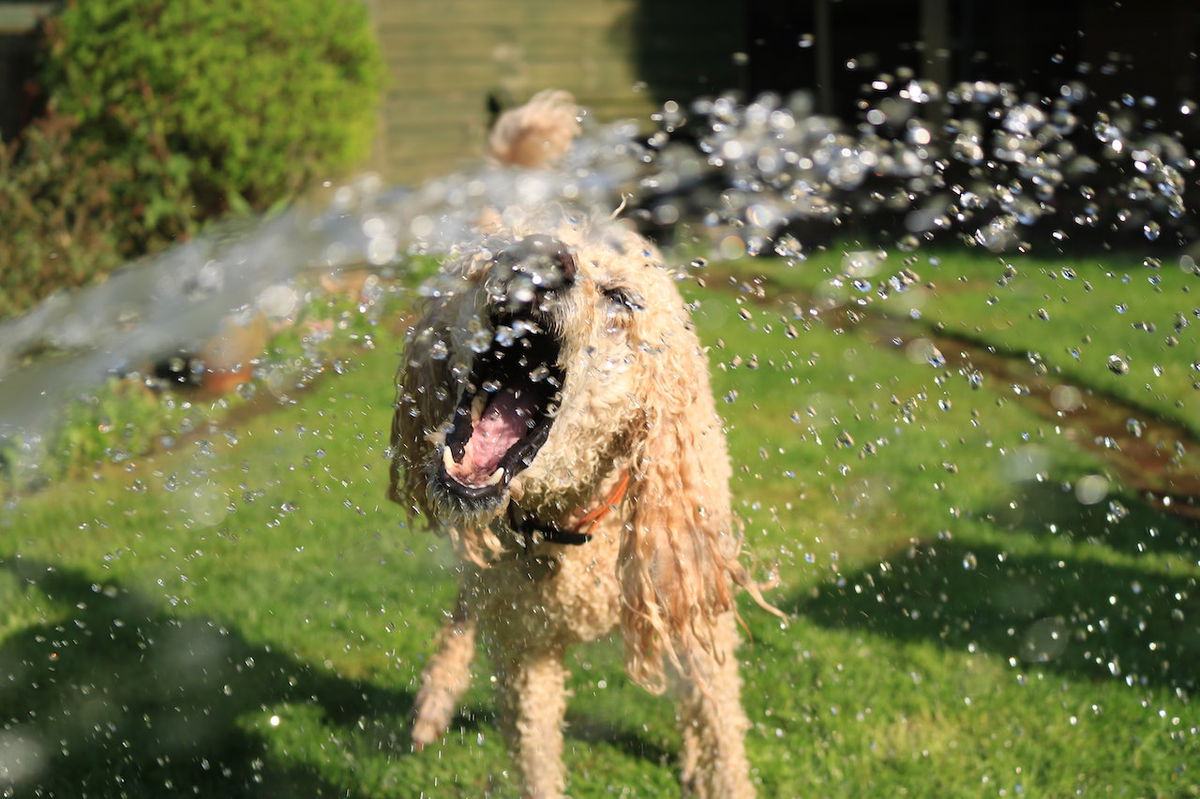
1. Poodles originated in Germany and not France
Despite their close association with the French people, Poodles were actually originally bred in medieval Germany.
2. Poodles were originally used for hunting
Don’t let the sophisticated looks of modern-day Poodles deceive you. These dogs were originally bred to hunt water birds.
Back in those days, the hunters would gun down ducks in rivers and it was the role of water dogs (such as Poodles) to rush into the marshes and bring back the catch to their master.
3. Poodles’ coats have hair, not the ordinary fur
Poodles are covered with hair (similar to human hair) and not fur. You may wonder what’s the difference between pet hair and pet fur.
Well, dog fur usually grows up to a certain height and falls off during shedding, but not so with hair. The hair on Poodle coats never stops growing and rarely falls off.
4. Poodles are very intelligent dog breeds
Poodles are highly considered as one of the smartest dog breeds which makes them a superb choice for many households.
Renowned canine psychologist Dr. Stanley Coren found that Poodles came second to the Border Collies in both working and obedience intelligence in his research on the intelligence of dogs.
The impressive mental capabilities of Poodles have seen them excel in trained work including their instinctual retrieving duties.
5. Poodles don’t shed a lot
Poodles are largely considered hypoallergenic dogs since they don’t shed hair too much compared to other dogs who shed fur.
These dogs are therefore a good choice for hypersensitive dog owners who may react negatively to pet dander and fur.
The only downside is that Poodle owners need to keep their canine friends well-groomed to maintain their coats in top condition.
This is why you are likely to see a lot of Poodle dogs with different haircuts that complement their charming personality.
Poodle Puppy
Before picking up a young Poodle pup from its mother, we suggest that you observe how they relate with their parents and littermates.
Monitoring their initial reaction will tell you whether they are fully weaned and what you can expect in terms of temperament.
These little furballs are filled with lots of energy, enthusiasm, and an infectious playfulness that makes them good canine companions.
Depending on the individual Poodle puppy, make sure to provide puppy-specific care including diet and socialization to make your young canine contented.
Poodle Types
1. The Standard Poodle
The standard Poodle is the largest size variant and they are believed to be the closest representation of the ancient Barbets and German waterdogs.
They have long legs and slim faces which makes them stand out from the crowd. These pups have the distinguishing curly hair which many owners love to shave in different styles.
Their versatile coat hair can be groomed in over 50 official styles at a professional pet salon.
A fully grown standard Poodle has a height range of between 35 – 40 inches and an average weight of 45 – 80 pounds. They tend to be more athletic than the other variants.
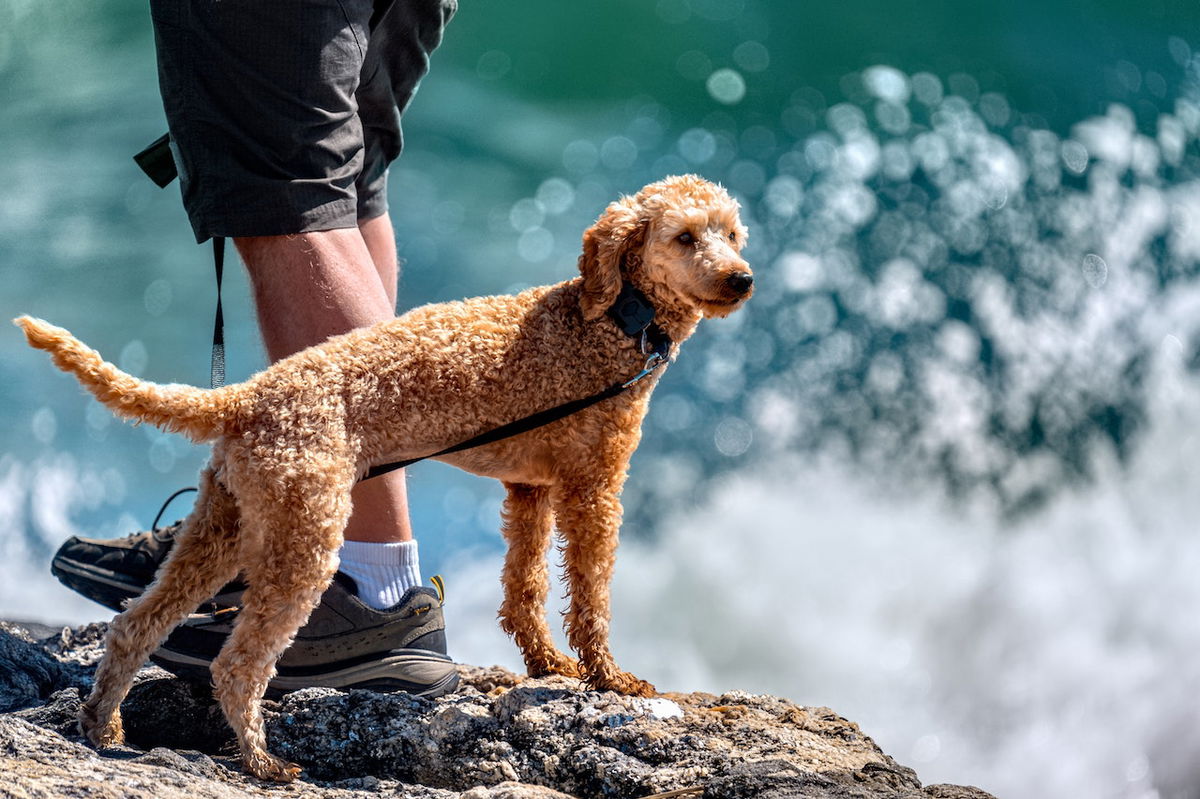
Standard Poodles are one of the most brilliant breeds, an intrinsic character that makes them prone to get stubborn at times.
The standard version of Poodles is extremely popular in dog shows across many countries because of their refined beauty and aptitude.
Apart from show arenas, these pups make good guard dogs even though they are not very intimidating, thanks to their alertness, courage, and unwavering loyalty to their owners.
2. The Miniature Poodle
Miniature-sized Poodles are ideally the smaller versions of their standard counterparts since they share many attributes.
Miniature Poodles are the most popular Poodle type because they have all the good qualities of their larger cousins in a smaller and more manageable body.
Both female and male miniature Poodles achieve a shoulder height of between 10 – 15 inches and they rarely weigh past 15 pounds.

Miniscule Poodles have the same hypoallergenic coat that is good for allergic individuals but it is usually fluffier than that of their larger counterparts.
The obedience and affection temperament of mini poodles make them a good choice for pet parents willing to train their pups.
When adopting a mini-Poodle, ask for a medical clearance for chondrodysplasia. This is a slight deformity where some pups are bred with longer legs and shorter backs.
3. The Toy Poodle
Toy Poodles are very similar to their minuscule relatives although they are even tinier. Both males and females measure about 10 inches and they weigh an average of 4 – 6 pounds.
Toy-sized Poodles are the perfect lap dogs for those looking for a closer companion to carry around with a doggy bag or purse.
These petite versions of Poodles are always loving and affectionate to their owners but sometimes they can be unfriendly to strangers.
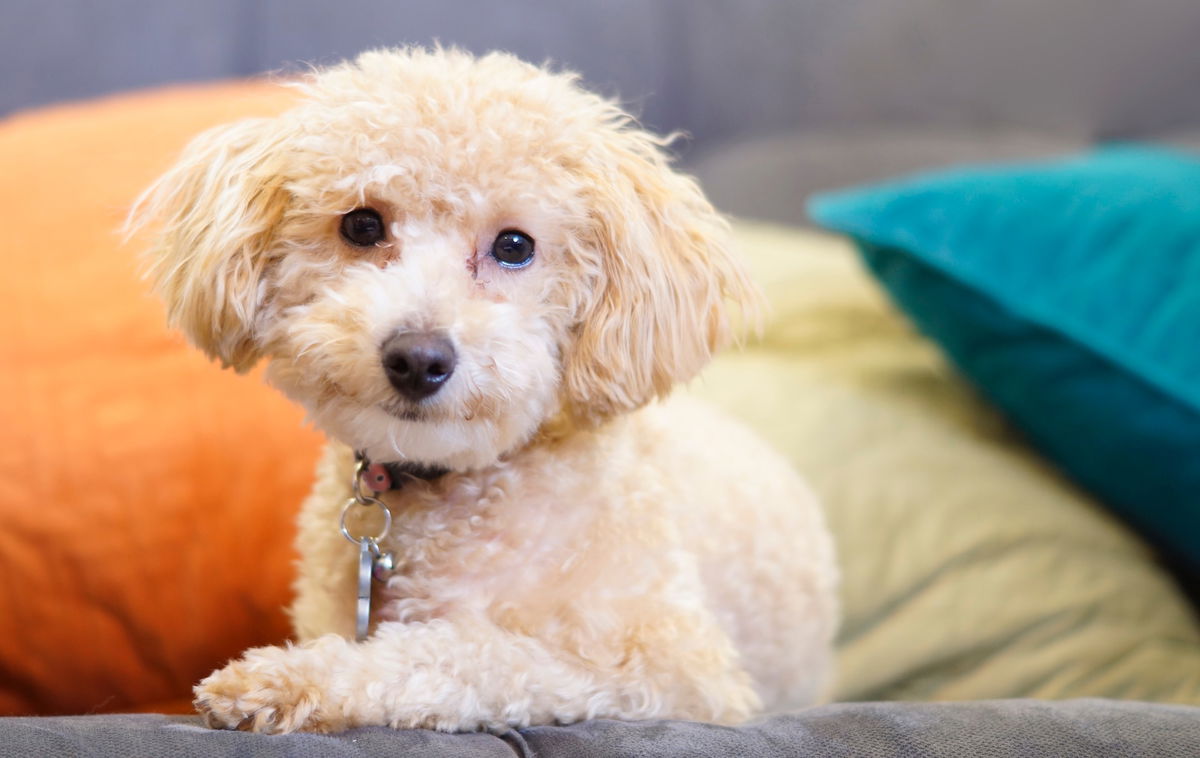
Toy Poodles are likely to suffer from separation anxiety when separated from their owners, so you’ll want to make sure there’s someone to look after them.
The downside about these doll-sized Poodles is that they can be skittish around small children and other household pets.
This makes them a tough choice to consider for larger families with small kids and multiple pets.
Despite their likelihood of emotional distress, toy Poodles are an excellent choice for a single person who resides in an apartment block.
4. Teacup Poodle
This is yet another popular size version of the Poodle dog breed but they are not officially recognized by the AKC.
Teacup Poodles are the smallest variation of the Poodle and they are indeed one of the smallest dogs alongside the Teacup Pomeranians.
These dogs are extremely small and can fit in the palm of your hand with only a few pounds of weight.
Despite being easier to handle, Teacup Poodles are the highest Poodle dog breed to maintain. This is because of their delicate size which makes them extremely fragile and flimsy.
Teacup Poodles need regular bathing and haircuts, and their small sizes make it a difficult task for many people.
If you own these extremely little Poodles, be careful about leaving them with toddlers because they may not know how to handle them with care.
5. Moyen Poodle
Many Poodle enthusiasts love the Moyen Poodle although they are not officially recognized by the AKC. This size variant falls in the middle of the standard Poodle and the mini version.
Despite their unique appearance and impressive character, Moyens, also called Klein Poodles, are underrated because of the limited knowledge about them among the public.
Moyen Poodles are a fantastic choice for pet owners who may find the standard version a bit larger and the mini version to be smaller.
A fully grown Moyen Poodle has a shoulder height of about 20 – 25 inches and an average weight of about 45 pounds.
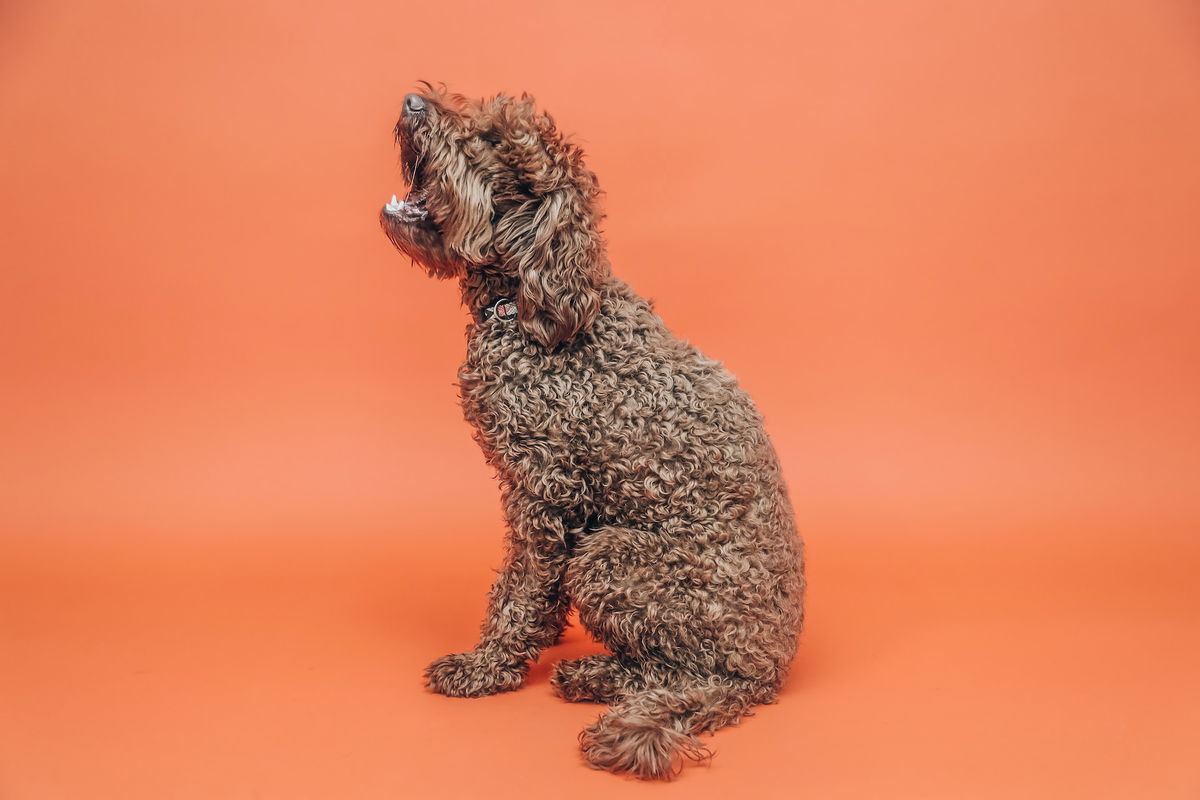
Of the many Poodle types outlined in our list, the Moyens are the best option for families because of their unparalleled obedience and easy-to-train attitude.
One of the biggest shortcomings of Moyens is their susceptibility to certain eye conditions such as cataracts and progressive retinal atrophy.
We suggest you find a reputable breeder who prioritizes health and eliminates these bad genes from Moyens before purchasing one.
6. Poodle Mixes
We also have several Poodle mixes, also known as Doodle dogs, besides the AKC-recognized purebred Poodles (Standard, Miniature, and Toy).
The last few decades have seen the rise of breeders crossing Poodles with other dog breeds to give rise to an almost hypoallergenic pup.
The increased demand for Poodle mixed breeds is mainly from allergic pet owners who desire the attributes of high shedding breeds but in a Poodle non-shedding coat.
There are over 40 recognized Poodle crosses, but here is a list of some of the most popular doodle dogs you can consider:
- Labradoodle (Labrador Retriever and Poodle)
- Goldendoodle (Golden Retriever and Poodle)
- Cavapoo (Cavalier King Charles spaniel and Poodle)
- Schnoodle (Miniature Schnauzer and Poodle)
- Cockapoo (Cocker Spaniel and Miniature Poodle)
- YorkiePoo (Yorkshire Terrier and Miniature Poodle)
Poodle Physical characteristics
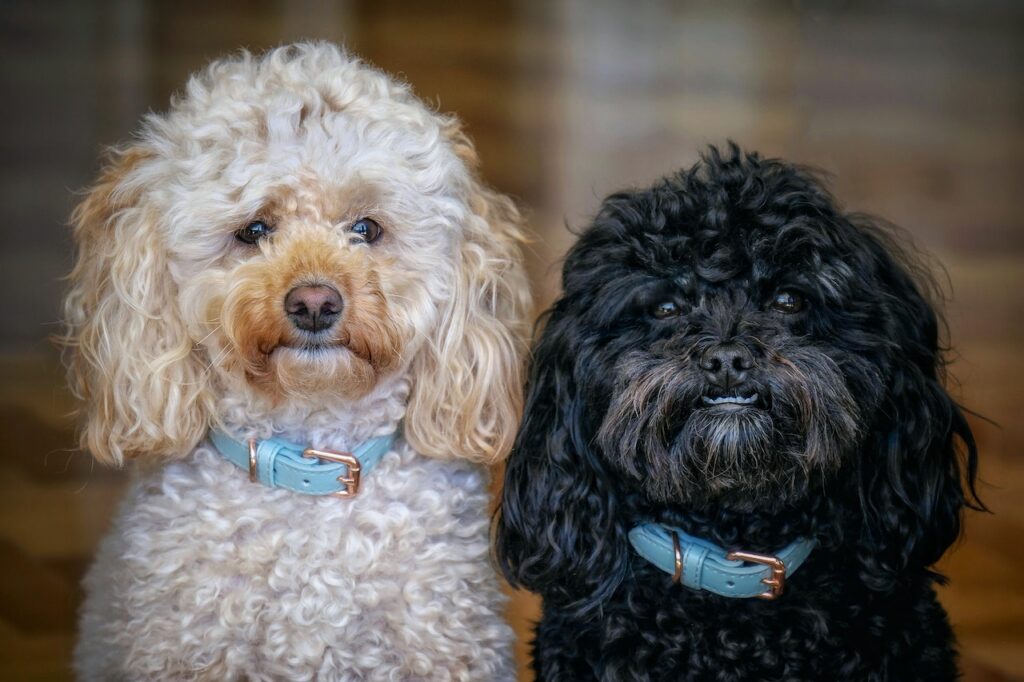
Size, weight, and Coat
| Poodle Type | Size Range (inches) | Weight Range (pounds) | Common Coat Colors | Coat Texture |
| Standard Poodle | Males: ≥ 45, Females: ≥ 35 | Males: 60-80, Females: 40-60 | White, Black, Apricot, Cream, Grey/Silver, Brown | Dense, tightly curled, wiry-textured outer hair. |
| Miniature Poodle | Both: 10-15 | Both: 10-15 | White, Black, Apricot, Cream, Grey/Silver, Brown | Dense, tightly curled, coarse textured. |
| Toy Poodle | Both: < 10 | Both: 4-6 | White, Black, Apricot, Cream, Grey/Silver, Brown | Dense, tightly curled, resembling wool |
Poodle Temperament and Personality
Poodle dogs are one of the most popular breeds in the US coming in at position five for the year 2022 according to the AKC registry.
These dogs share an easy-going temperament no matter the size variety. It’s because of their stable temperament and intellectual prowess that poodles are found in many homes as pets.
Poodles are a great household pet for large families with younger children. Bear in mind that all kids should be taught how to interact with dogs no matter the breed’s temperament.
The smallest varieties of Poodles, both the toy and the teacup breeds are extremely delicate and should never be left with children without supervision.
Poodles are also a good choice for people with multiple pets at home. These elegant-looking canines can grow up with both small-sized and large-sized pets so long as they are introduced at an early stage.
Novice dog owners can hardly go wrong with a Poodle. This is because of their impressive personality and strong brain power which makes them easy to train canine.
First-time dog owners are likely to make unavoidable mistakes during their first few weeks of pet ownership, but the Poodles can be forgiving during the learning curve.
Poodle Intelligence
Poodles are considered one of the brainiest dog breeds across the world, coming second to the Border Collies according to research by Dr. Stanley Coren.
These dogs were bred for their ability to retrieve gunned waterfowl, making them adept at following hand signals and commands from their masters.
Owning to their remarkable brainpower, Poodles are excellent students when it comes to training and they excel in performance sports and obedience schooling.
Poodle Health and Lifespan
Average lifespan
Poodles have a slightly longer lifespan compared to other breeds of their class. They typically live between 12 to 15 years, although some have been known to reach older ages.
A Poodle dog named Lady (1908 – 1937) is the longest-living poodle to be recorded having lived a good life for 28 fruitful years.
This extended lifespan means that Poodle owners can enjoy a longer and more fulfilling pet ownership journey with their beloved pups.
Common health issues and genetic disorders
Poodles are generally healthy dogs, but as with any other breed, they are prone to certain genetic disorders and health problems.
The following are some of the most common health problems in Poodles:
- Addison’s Disease
- Hip Dysplasia
- Thyroid diseases
- Eye problems
- Patella luxation
- Bloat
- Sebaceous Adenitis (a skin problem)
- Von Willebrand’s disease (a blood disease)
- Epilepsy
- Optic Nerve Hypoplasia
Preventative measures for good health
Routine visits to your local veterinarian are crucial in maintaining your Poodle’s health. Your vet can provide vaccinations, conduct regular wellness exams, and intervene when your dog is unwell.
Poodles can benefit immensely from a balanced diet that includes high-quality canine-specific food. Consult with your veterinarian to determine the most suitable diet for your Poodle.
Some of the factors to consider when choosing a diet include age, size, health, and activity level. Limit the amount of carbohydrate intake since they can cause obesity and other chronic issues.
Make sure to select a responsible breeder who follows ethical breeding practices when purchasing a Poodle. This helps reduce the risk of hereditary conditions that are prone to this breed.
Reputable breeders screen their dogs for common health issues, making it less likely that your Poodle will inherit any genetic disorders. They also inbreed healthy parents to reduce poor genes.
Daily physical activities and mental engagements can help shape your Poodle’s health and emotional well-being.
Poodles and Allergies
Poodles are hypoallergenic breeds – meaning their coats shed very little hair. These dogs are therefore a good choice for people with allergies.
Many individuals with allergies can live with Poodles without experiencing a negative reaction due to pet hair.
Poodle Grooming Needs
Poodles need regular brushing and trimming to keep them in top condition. Most Poodle owners adopt haircuts that keep the coat shorter and easier to maintain.
If you’re considering bringing a Poodle into your home, make sure to factor in the high maintenance costs that come with these elegant canines.
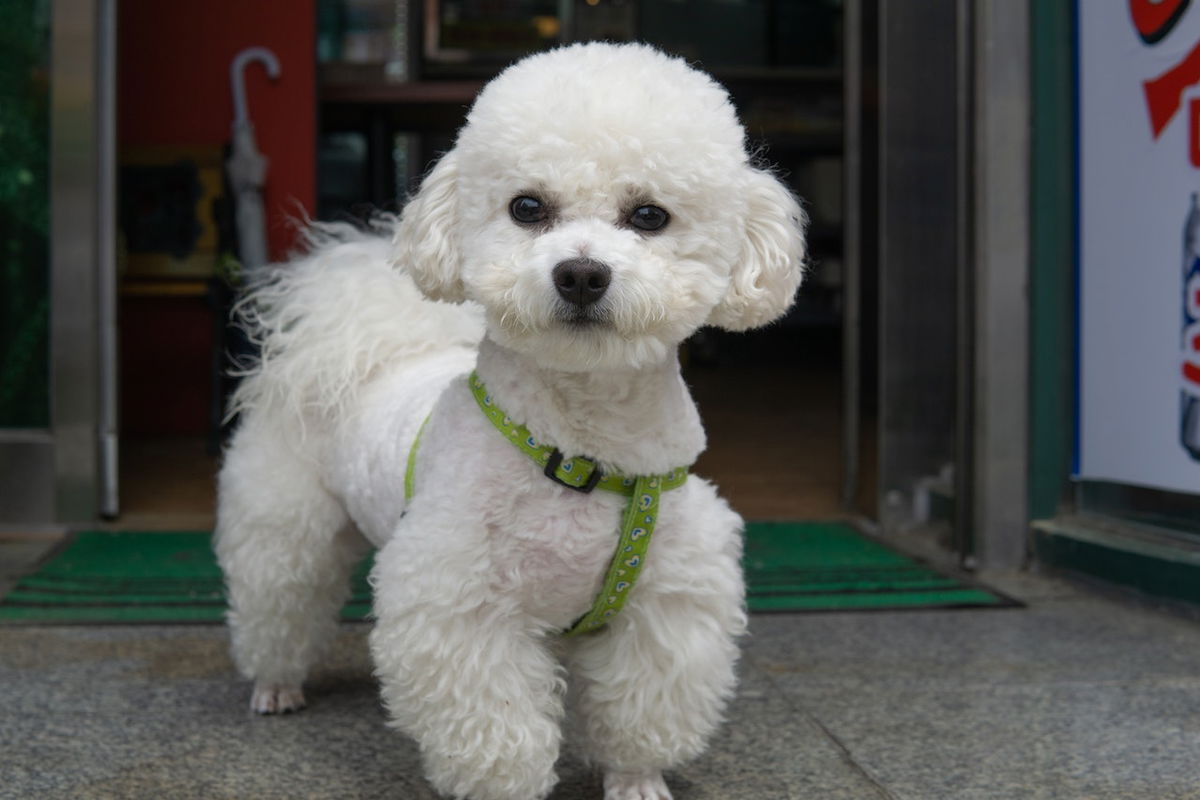
Poodles will typically require a complete grooming procedure every four or six weeks depending on the individual dogs and hairdo.
You can either learn how to groom your Poodle at home or take them to a nearby pet salon for a round of professional grooming.
It’s essential for Poodle owners to regularly brush their dogs since the hair is retained deep in the coat rather than falling off.
Failure to properly brush your Poodle can lead to matting and tangling which is both unhygienic and unpleasant to the eye.
We recommend gliding through your dog’s coat at least twice or thrice a week although some owners find it best to brush daily.
Bathing and trimming your dog’s nails can be done once in every four or six weeks. Remember to use dog shampoo and other canine-specific grooming products when washing your dog.
Monitor your dog’s ears weekly to see if there’s any abnormality that warrants your concern. Always use a soft cotton ball and vet-approved ear cleanser to gently wipe down your dog’s ear canals.
For optimum dental care, use a canine toothpaste and soft toothbrush to brush your Poodle’s teeth every day. This will prevent dental disease and keep your dog’s mouth smelling fresh.
Poodle Exercise and Activity Levels
Daily activity needs
All Poodle size variants have high energy levels and they require a good amount of physical activity to keep them happy and in good shape.
Working your dog out is helpful to prevent boredom and to channel their energy into constructive activities.
The exact amount of exercise and intensity of activities your Poodle needs can vary depending on their size, health status, and age.
For the most part, you can expect to provide an adult Poodle with 45 minutes to 1 hour of exercise daily, broken into several manageable sessions to avoid overexertion.
Suitable activities and games for Poodles
The following are some of the interesting games and activities you can offer your Poodle to burn off their excess energies:
- Brisk walks
- Jogging
- Runs
- Hiking
- Swimming
- Game of fetch
- Hide and seek
- Puzzle toys
- Obedience training
- Agility training
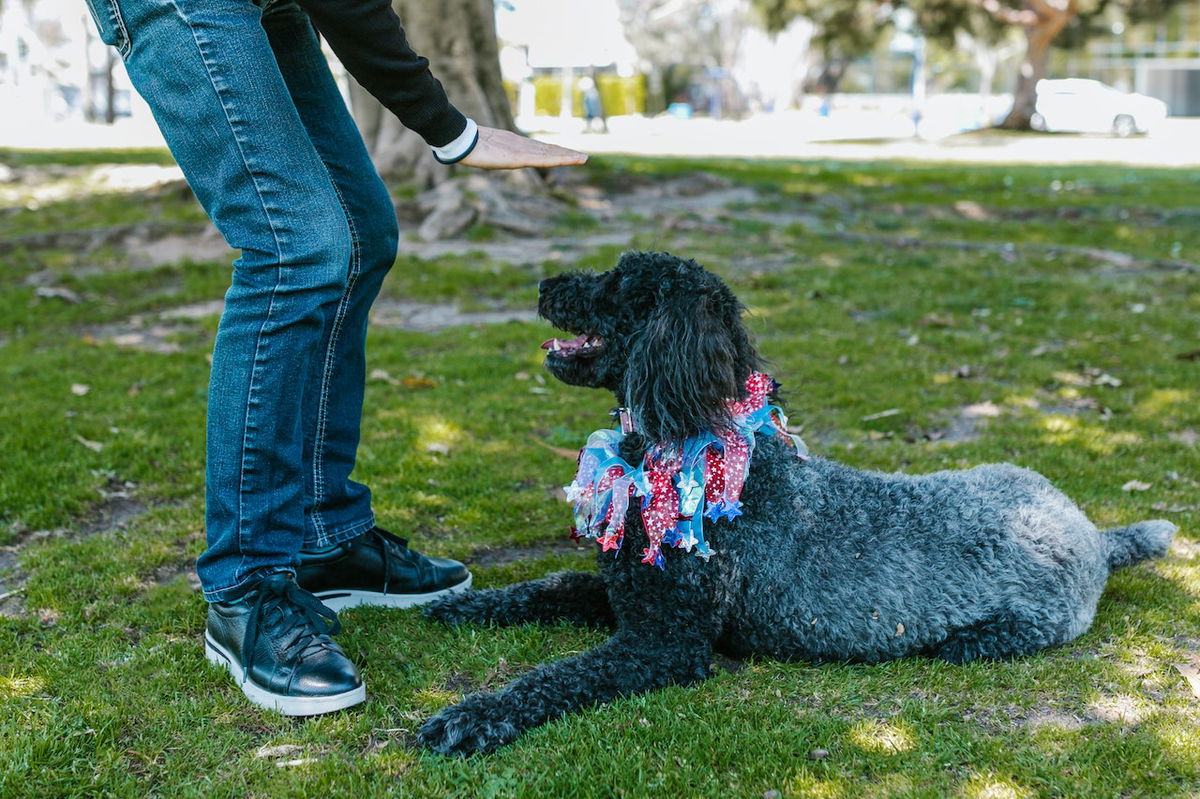
Importance of mental stimulation
- Mental stimulation is crucial to keep your Poodle’s mind active and prevent boredom, which could otherwise lead to destructive behaviors.
- Engaging in puzzle games, obedience training, or even learning new tricks can provide the intellectual challenges Poodles need to stay content and fulfilled.
- Puzzle games can also prevent the mental decline in aging Poodles which enables them to live a longer and fulfilling life.
- The relationship between you and your lovely Poodle can also be strengthened through daily interactions and mental games.
Poodle Training and Socialization
Just like all other dog breeds, Poodles can benefit from consistent training and socialization programs to be well-rounded and responsible pets.
Training a Poodle on new commands is an easy endeavor because of their smartness and eager-to-please attitude.
Failure to train your dog on obedience right from a young age can make them think it’s okay to get away with destructive habits.
As a responsible Poodle owner, you should aim to enroll your Poodle puppy in obedience classes once they are fit enough for training.
It’s also important to start socializing your Poodle puppy as early as possible by exposing them to other people and other pets in different settings.
Poodle living conditions
Standard and Moyen Poodles can thrive in spacious living areas with a backyard or garden for outdoor activities.
Miniature, toy, and teacup Poodles can do well in smaller living spaces such as apartment blocks and flats. This is because a huge living area may be overwhelming for smaller canines.
Irrespective of your living area, make sure to puppy-proof your home and set up all the basic amenities that your Poodle will need to be contended.
Poodle Diet and Nutrition
Poodles need a generous serving of quality canine diet to keep them healthy and well-balanced. It helps to discuss your dog’s dietary needs with a qualified vet nutritionist.
Your vet will work out a meal plan based on your dog’s immediate needs and long-term nutritional nourishment.
Remember to have strategic water points across your house to provide your Poodle with an uninterrupted supply of clean drinking water.
Poodle Pregnancy and Litter Size
The gestation period for most Poodles is about 63 days. The litter size can vary but usually falls between 3 – 8 puppies, depending on several factors such as the age and health of the parents.
Ensure that both the mother and puppies receive appropriate prenatal and postnatal care to ensure a safe pregnancy journey and healthy delivery process.
We recommend you speak to your veterinarian or an experienced breeder if your whelping Poodle stays in labor for more than 12 hours.
Conclusion
Poodles dog breeds offer more than their stylish looks. These regal canines embody the perfect combination of a smart dog with a natural drive for athleticism.
From bigger standard-size Poodles to smaller ones including the teacup variant, you can never go wrong with an intelligent canine buddy by your side.
Remember to train and socialize your Poodle from a young age to make them well-rounded and adjusted to a family setup.
Laura is the founder of Furs'n'Paws. She is a also a pet writer and expert with more than 20 years of experience of working with dogs and cats. She developed a very strong love for animals at a young age. Her passion led her to establish a thriving pet sitting and dog walking business in Dubai. As an expert in pet training, behavior, and nutrition, Laura is committed to helping pet owners and pet lovers by offering high-quality information on a wide range of topics.


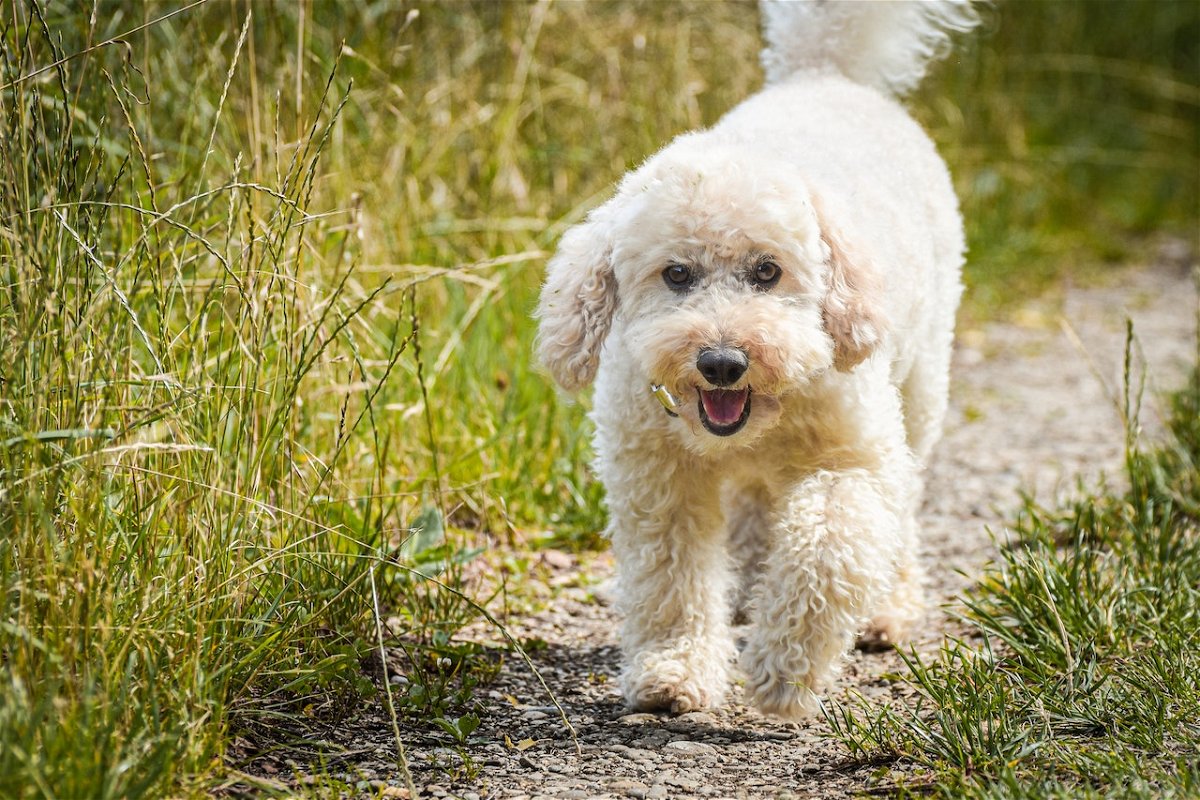
No responses yet